The meeting, which took place on the basis of the Kyiv Journalists’ Solidarity Center (JSC), was attended by the President of the National Union of Journalists of Ukraine (NUJU), Sergiy Tomilenko, the First Secretary of the NUJU and the coordinator of the JSC network, Lina Kushch, the head of the Luhansk regional organization of the NUJU Andrii Shapovalov and regional journalists, the Chernivtsi coordinator of the Western Ukrainian JSC of the NUJU, Volodymyr Bober.
As Kyiv JSC coordinator Illia Suzdaliev noted, a number of meetings are currently being held with journalists from the front-line and de-occupied territories. In particular, such meetings have already taken place with colleagues from the Donetsk and Kherson Regions. At such meetings, their participants discussed urgent problems and challenges regarding media support in the regions.
He also noted that the Luhansk Region differs from other front-line areas by the fact that it is occupied for over 90%, which is why Luhansk journalists have no opportunity to live and work in their cities. They need help, and their proposals for the necessary support can be an argument when the NUJU asks foreign partners for help.
The meeting took place in the format of a dialogue of mutual interest: Luhansk residents talked about their problems, NUJU President Sergiy Tomilenko and NUJU First Secretary Lina Kushch informed about the work of the Union and answered journalists’ questions.
Thus, NUJU President Sergiy Tomilenko spoke about the unprecedented solidarity of international journalistic communities with Ukrainian colleagues, about how the help of the foreign journalistic community enables our media not to lose stability and work in the difficult conditions of a full-scale war.
The President of the NUJU notes that Ukrainian journalists, among whom there are many Luhansk residents, make a great contribution to the informational resistance to the occupiers, bringing to the general public truthful information about current events, about the war crimes of the occupier, information that supports Ukrainians in difficult war times. At the same time, we have to say that today, the vast majority of Ukrainian journalists, especially among displaced people, face the problem of media stability and survival in the profession.
“The NUJU is open to all inquiries from our media representatives. The key priority in the work of the National Union of Journalists of Ukraine is to help colleagues who are experiencing a lot of trouble and problems during the large-scale russian aggression against our country,” Sergiy Tomilenko emphasized. “We immediately present all the help we receive from international partners to the newsrooms that need it the most. In particular, we are trying to urgently support media workers whose offices or homes were destroyed or damaged as a result of enemy shelling. Special attention is paid to the problems of regional and local media journalists, who objectively have fewer chances to communicate with international donors and receive their help.”
“Our international partners are showing unprecedented solidarity with the NUJU,” said Sergiy Tomilenko. The Union maintains close contacts with national associations of journalists of European countries. Thanks to the help of the European journalistic community, many Ukrainian newsrooms received grants from the NUJU and other Ukrainian journalistic organizations. Thanks to international assistance, more than thirty printed editions in the front-line regions resumed publication.
The NUJU tries to convey to international organizations that as long as the hot phase of the war continues in Ukraine and as long as no region in Ukraine is safe for life, Ukrainian journalism needs external partner support. But it is obvious that such support cannot be endless.
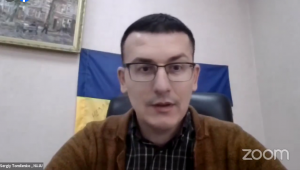
Unfortunately, recently, we have to state that foreign colleagues were not ready for such a long period of full-scale war in Ukraine and for long-term programs to support the stability of Ukrainian media.
Therefore, the NUJU views international support as life-saving medicine for the patient in the acute phase of a disease. In our situation, international support is the cure that helps journalists stay in the profession, preserve the sustainability of the media, and have time to rebuild their work under the conditions of the wartime and postwar period.
“We are glad to welcome those who join the community of the largest independent journalistic association in Ukraine,” said Sergiy Tomilenko. “But in the conditions of the full-scale war, our services are available not only to the NUJU members but to all journalists who need support.”
In particular, since the beginning of the full-scale war, the NUJU has given journalists sixty laptops and cameras provided by foreign donors. Those who work in hot spots receive first-aid kits, protective equipment is available for rental – we provide helmets and body armor. We organize training sessions, seminars, and webinars that help navigate events, maintain media sustainability, teach self-defense, how to provide first aid to victims, etc.
Currently, less and less technical resources are coming from donors. But, understanding the needs of Ukrainian media workers, the Union is trying to find a resolution to this issue.
“It is only worth emphasizing that when you write an application for the necessary equipment, you must clearly argue the need for its provision. That is, you need to tell which audience your mass media works for and why the content of the publication is important for the general public. Then it will be easier for us to argue for appeals to international donors,” added Sergiy Tomilenko.
You can find out about all the services provided by the NUJU on its website, www.nsju.org, and the Telegram channel SPILKA.News, on the NUJU’s Facebook page, where information about important news and events from the life of the Union, as well as grants, contests, and participation, is promptly disseminated, which will provide an opportunity to receive funds for professional journalistic activities.
NUJU President Sergiy Tomilenko also spoke about the network of Journalists’ Solidarity Centers. The activities of these very important centers during the full-scale war, operating in Kyiv and six other regions of Ukraine, are supported by the International and European Federations of Journalists and the UNESCO Headquarters.
According to Sergiy Tomilenko, the priority hubs work in the front-line regions – Kharkiv, Dnipro, and Zaporizhzhia. JSCs in Lviv, Ivano-Frankivsk, and Chernivtsi are also conducting important work. Colleagues are always welcome. Here, they can be provided with workspace, interesting events, and comfort with caring communication to everyone who applies, no matter what area a journalist is from.
Sergiy Tomilenko also informed that with the beginning of the large-scale invasion, the journalist shelter program for Ukrainian media workers in Kosovo began to operate. This program is administered by the German European Center for Press and Media Freedom (ECPMF).
The President of the Union notes that this is one of the best programs, under the terms of which housing in the capital of Kosovo and a monthly scholarship of EUR 500 are provided. Participation in various trainings and events is organized. In particular, two journalists from the Luhansk Region, Maryna Zhyvotkova and Viktoriya Kaidash from Troyitske – are currently staying in Kosovo under this program. And what is very important, they can be joined by other colleagues who would like to go to Kosovo for a certain time. The NUJU is ready to provide appropriate recommendations, and Maryna Zhyvotkova can tell you how to do it better.
“We are once again talking about the importance of the work of all Ukrainian media workers, not only the journalists of the Yedyni Novyny telethon, on the information front, in the fight against enemy propaganda,” Sergiy Tomilenko emphasized. “And since the first days of the full-scale war, the NUJU has been lobbying at all levels for the creation of the Ukrainian Media Support Fund. It was also discussed during the meeting with the Minister of Culture and Information Policy, Rostyslav Karandieiev. We understand that during the war, the resources of the state budget were quite limited. Therefore, we emphasize that the government should request international partners to support Ukrainian journalism. Among the Europeans, there are governments (for example, Norway) where the issue of freedom of speech and support of independent journalism is among the priorities. These governments can provide support to Ukrainian journalists in restoring and preserving the stability of the media. We also propose to create, as a pilot project, a special support section for front-line local media within the framework of the Ukrainian Cultural Fund. We hope for a positive decision from the government.”
NUJU First Secretary Lina Kushch, who understands and feels all the problems of Luhansk colleagues, told about one of the current initiatives of the Union. After all, back in 2014, she was forced to leave occupied Donetsk and actually start her life over.
Today, she is talking about the Union‘s plans for long-term support of Ukrainian mass media.
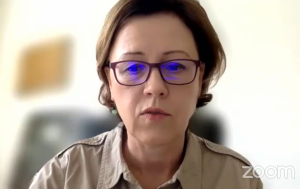
“The Luhansk Region is a vivid example of how the journalistic community has been forced to work remotely for two years. Therefore, the desire of our colleagues to unite and act as a single community of Luhansk journalists is particularly pleasing,” said Lina Kushch. “Since the end of 2023, the NUJU has been promoting an important message regarding long-term support for Ukrainian journalists: we declare that any program for the recovery of Ukraine and any statements about the recovery of Ukraine must necessarily include clauses about the recovery of the media.”
Unfortunately, all the recovery programs for Ukraine that the Ukrainian government proposed at the conferences in Lugano, Switzerland, in London, and now in June, will present the recovery program in Berlin. There is no mention of the recovery of the Ukrainian media.
The media are seen as those who will disseminate information in print publications, on radio, and on television. However, none of the government officials has yet said that along with the reconstruction of the infrastructure and enterprises destroyed by russian troops, educational and medical institutions, etc., Ukrainian mass media should be restored in the regions.
“But in order to cover the restoration of Ukraine, it is necessary to restore the Ukrainian media first. In order to attract the attention of international donors to this issue at the conference in Berlin, the NUJU initiative should be joined by a wide circle of our journalists. This will be long-term support for Ukrainian media,” Lina Kushch emphasized.
So she offered Luhansk journalists to record short, literally 30-40 second videos – stories about how exposed to danger they left the temporarily occupied territories, trying with all their might to remain in the profession.
Such videos in the NUJU will be collected together with subtitles in English, and they will best convey to foreign donors why the Ukrainian mass media will not be able to survive and continue to work without external support.
*****
How the war destroys not only houses, businesses, and the energy system but also human lives and how difficult the situation in the media environment is can be judged from the speeches of the meeting participants – journalists of the Luhansk Region.
In particular, Andrii Shapovalov, the head of the Luhansk regional organization the NUJU, says:
“There is no possibility to talk about the full-fledged work of the regional Union today because the journalists who worked in the mass media of the Luhansk Region before the full-scale war have left today, wherever they had the opportunity. Many have gone abroad, and many live in Ukraine, but it is currently not possible to establish exact information about the whereabouts of the majority. Even contact with the executive secretary of the regional organization has been lost.”
Andrii Shapovalov is grateful to the NUJU for paying attention to the problems of Luhansk media workers and, despite all the organizational difficulties, is ready to cooperate with the NUJU‘s head office and Journalists’ Solidarity Centers in solving all issues of association and support of colleagues.
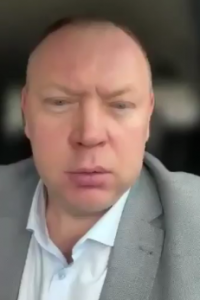
Dmytro Klimanov, the publisher of TELEhazeta from the Luhansk Region, has lost his newsroom twice: in 2014 in Kadiyivka from separatists, and then in February 2022 in Starobilsk, when the relocated publishing house once again found itself in temporarily occupied territory. And he found the strength to start all over again for the third time: in April 2022, the publishing house resumed the work of the TELEhazeta website. Therefore, a wide audience, including residents of the occupied territories, continue to receive objective news from a publication they know well and trust.
During this meeting at the NUJU, the publisher said:
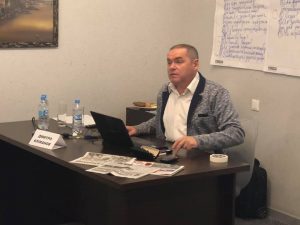
“Without the donor assistance of foreign partners, we would have ceased to exist a long time ago. But, unfortunately, nowadays, we feel more and more how this donor aid is being reduced. Therefore, I would like to hear whether there are any specific actions of the state in support of Ukrainian media broadcasting to the temporarily occupied territories? After all, if the state does not make key decisions regarding assistance to local media and publications from the occupied territories in the near future, there will be no one to restore them already in the fall. Most of these media will cease to exist.”
Another participant in the meeting, Oleksandr Zabrodin, worked in Sievierodonetsk on the eve of the large-scale invasion at Suspilne Donbas. With the beginning of active hostilities, he was forced to move with his family, first to Cherkasy and then to Zaporizhzhia. Now, the journalist works in the Svoi Dim publication of the ABO editorial network, covering the problems of people who, due to the aggression of the russian enemy, lose their health, housing, and the opportunity to work. He says that recently he and his colleagues are trying to find more positivity in order to support people’s belief in victory, that everything will be rebuilt and life will improve.
His own problem is the technique for work. When they urgently left Sievierodonetsk to escape from the occupiers, they had to leave all their belongings, including the computer, at home. The journalist said that thanks to the help of the producer of Suspilne Donbas, Oleksandr Marchenko, who is currently fighting in the ranks of the Armed Forces of Ukraine (AFU), he received a laptop from the Institute of Mass Information.
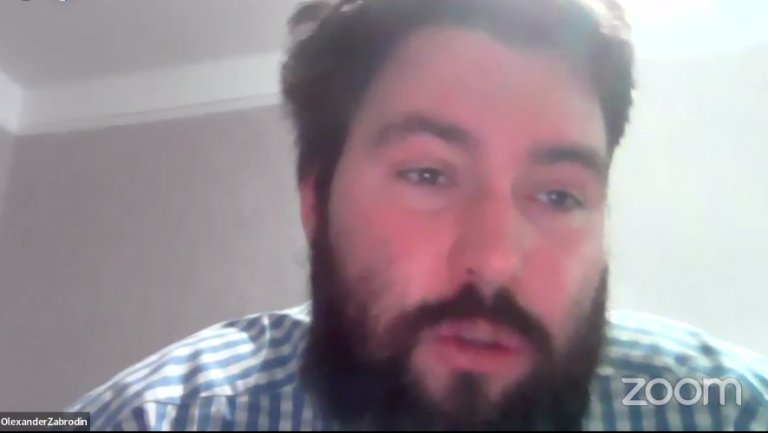
And immediately notes that after two years of intensive use, the laptop “breathes out,” therefore, the problem of the working computer clearly appears again. Therefore, he is interested in grant programs that can support and provide an opportunity to obtain resources for further work in journalism.
He also shared the following information:
“One of my problems as a forced migrant is the insufficient circle of communication in the journalistic environment of Zaporizhzhia, where I currently live. Sometimes, you want to share your thoughts with colleagues or even just go for a friendly coffee. And how to enter the Zaporizhzhia journalistic environment, I do not know.”
Therefore, Oleksandr was interested in information about the work of the Zaporizhzhia JSC, where he will be able to find much-needed communication with his colleagues, get involved in interesting cases, and be aware of all the events of the Zaporizhzhia journalistic community, to which he now belongs.
The Luhansk journalist also spoke about the law on mobilization recently adopted by the Verkhovna Rada and signed by the President of Ukraine. He is interested in what actions are planned for journalists and whether the NUJU has any concrete developments, recommendations, or advice in this matter.
Responding to questions about the mobilization processes, Sergiy Tomilenko noted that due to certain organizational issues, it is not yet time to talk about this topic. He said that along with helping civilian journalists, the NUJU pays more and more attention to supporting colleagues who serve in the ranks of the AFU.
“We are developing a support line for press officers: we give them cameras and laptops for work and organized a fundraiser for two cars for press officers. One of these vehicles has already been transferred to the Soledar District, and the second will soon be sent to press officers in the Druzhkivka, Chasiv Yar district,” the President of the NUJU said.
Olha Voitsekhivska, Journalist of Ukraine

 THE NATIONAL UNION OF
JOURNALISTS OF UKRAINE
THE NATIONAL UNION OF
JOURNALISTS OF UKRAINE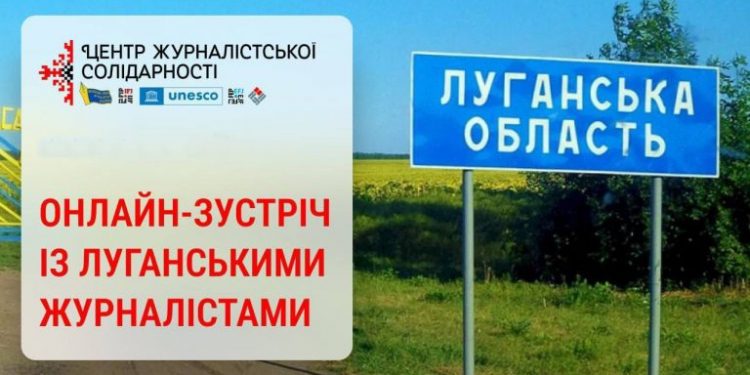
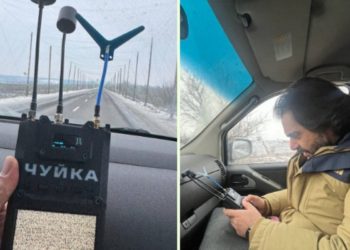
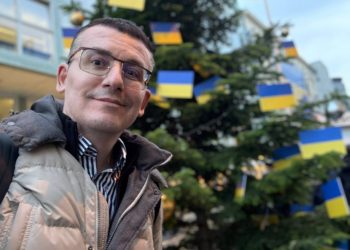
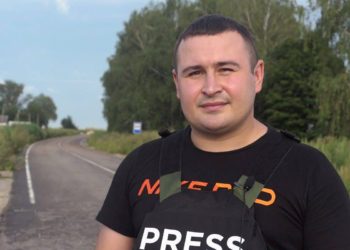













Discussion about this post